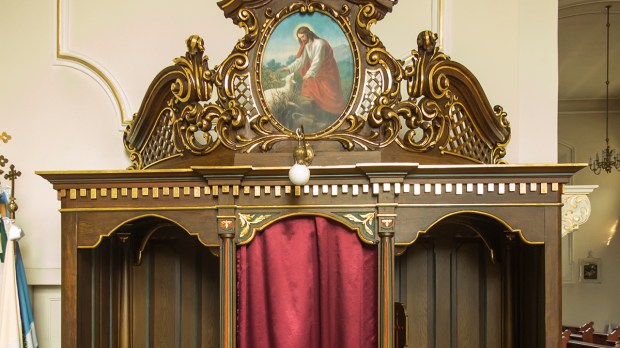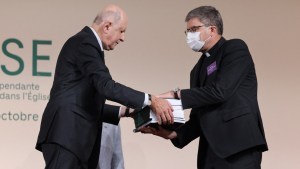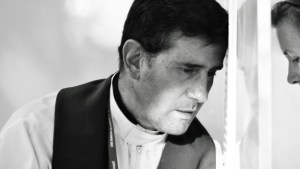In response to a report last month that estimated thousands of cases of sexual abuse by clergymen and others in the Church over the past seven decades, the Catholic bishops of France are planning to ask Pope Francis for help in putting reforms into effect. They also said at their annual plenary assembly November 2-8 that lay-led commissions are going to be established to work out reform measures.
One issue that has come up as a possible reform is changing the practice of keeping the matter of sacramental confessions completely secret — known popularly as the Seal of Confession.
The 2,500-page report by the Independent Commission on Sexual Abuse in the Church (CIASE) said:
The Church must issue precise directives to confessors regarding the seal of confession. Confessors must not be allowed to derogate, on the grounds of the sanctity of the seal of confession, from the obligations provided for by the [French] Criminal Code, which are compliant with those of natural and divine law which provides for the protection of a person’s life and dignity, to report to the competent authorities cases of sexual violence inflicted against a child or a vulnerable person. This is not to question the seal of confession generally; but within the scope of sexual violence inflicted against children, a reminder is issued that the letter and the spirit of the law of the French Republic … apply to every single person on French territory.
This is not the first time the Church or any of her ministers have come under pressure to violate the seal of confession. In the early days of the American Republic, there was a case in which a Catholic confessed to his priest that he had received stolen property. The priest refused to testify in court about it. De Witt Clinton, then Mayor of New York, defended the priest, saying, ”It is essential to the free exercise of a religion, that its ordinances should be administered — that its ceremonies as well as its essentials should be protected. … The sinner will not confess, nor will the priest receive his confession, if the veil of secrecy is removed.”
But since the American Catholic clerical sexual abuse scandal blew up nearly 20 years ago, there have been legislative efforts to force priests to reveal to law enforcement authorities anything they have learned in the confessional about potential or actual sexual abuse. Child protection advocates and civil lawmakers have fought to have clergymen included in the list of “mandatory reporters” — professionals who are obliged to report evidence of child abuse or turn over information that could prevent the commission of a crime. As revelations of clergy sex abuse have made headlines around the world, other countries have tried to pass similar laws, sometimes succeeding.
In the United States, such efforts have largely failed, but a handful of states have denied religious exemptions from mandatory reporting laws, the New York Times reported.
French bishops respond: ‘Non’
In response to the French commission’s recommendation, Archbishop Éric de Moulins-Beaufort of Reims, president of the Bishops’ Conference of France, reaffirmed the Church’s position on the absolute secrecy of confession, calling the restriction “superior to the laws of the Republic.”
Karine Dalle, spokeswoman for the bishops’ conference, amplified Archbishop de Moulins-Beaufort’s words, telling Solène Tadié of the National Catholic Register on October 13, “One cannot change the canon law for France as it is international. A priest who today would violate the secrecy of the confession would be excommunicated.”
Dalle added: “We know that if these rules were to be adopted, no abuser would ever go to confession if they knew that they would be reported if they confessed to abusing a minor under the age of 15.”
The Church considers this matter so important that the Code of Canon Law stipulates that a priest-confessor who violates the seal incurs a penalty of excommunication.
This week, Jesuit Fr. Hans Zollner, one of the leading experts in the Church working for the protection of children against sexual abuse, asserted that there is no compelling evidence showing that abuse would be prevented by breaking the seal of confession.
“The seal of confession creates a sacred space in which a penitent is completely free to put before God whatever is on their conscience, and — when they show contrition — find forgiveness, reconciliation and healing,” Fr. Zollner, director of the Institute of Anthropology: Interdisciplinary Studies on Human Dignity and Care at the Gregorian University in Rome, wrote in an op-ed article in the Tablet. “The absolute secrecy of the confessional explains why people feel free to say things in confession they wouldn’t say anywhere else.”
Pope Francis explained in 2019 that the Seal is “indispensable for the sanctity of the sacrament and for the freedom of the conscience of the penitent, who must be certain, at any time, that the sacramental conversation will remain within the secrecy of the confessional, between one’s own conscience that opens to grace, and God, with the necessary mediation of the priest.
“The sacramental seal is indispensable and no human power has jurisdiction over it, nor lay any claim to it,” Francis said.
In 2019, in a Note approved by Pope Francis, the Vatican’s Apostolic Penitentiary reaffirmed the importance of the seal. It said:
Any political action or legislative initiative aimed at “breaching” the inviolability of the sacramental seal would constitute an unacceptable offense against [the freedom of the Church], which does not receive its legitimacy from individual States, but from God; it would also constitute a violation of religious freedom, legally fundamental to all other freedoms, including the freedom of conscience of individual citizens, both penitents and confessors. Breaking the seal would be tantamount to violating the wretched man within the sinner.
“Children suffer”
Nevertheless, child welfare advocates say that protection of children should take precedence.
“We need to begin to think about eliminating the confessional privilege,” Marci Hamilton, chief executive of Child USA and author of Justice Denied: What America Must Do to Protect Its Children, wrote in a 2018 New York Times op-ed. “Only one-third of abuse victims report what happened to them while they are still children. This is because of the power chasm between them and their abusers, threats from perpetrators and sometimes the children’s inability to comprehend fully what has been done to them. The insidious effects of trauma from depression, post-traumatic stress disorder, substance abuse and other medical problems also hinder reporting. For all these reasons, the average age for victims to come forward is 52.”
Hamilton argued that clergy members are more likely to know about abuse than teachers or doctors. “Yet just under half of the states do not mandate that clergy members report suspected abuse to the authorities or child protective services. When religious organizations keep these facts circulating internally while failing to disclose them to the public, the children suffer.
“Even those states that treat clergy members as mandated reporters still may not require reporting in circumstances where the information was gleaned through a ‘clergy-penitent’ communication,” Hamilton wrote. “All states recognize a confessional privilege that can immunize clergy members from reporting if they learn the facts of reportable crimes through one-on-one communication with a parishioner. … A few states have explicitly or implicitly denied the privilege — New Hampshire, North Carolina, Oklahoma, Rhode Island, Texas and West Virginia — if the issue is child abuse or neglect. But elsewhere confessional privilege can operate as a high bar to child protection.”
It’s not just a matter of priests learning about sexual abuse while hearing a confession, however. Laëtitia Atlani-Duault, a member of the commission that wrote the French report, alleges that some victims wishing to report past abuses or expose active abusive priests were told to speak about it during confession. This would have the effect of suppressing their revelations and turning the sacrament into a “weapon of silence,” according to the Times.
“The fact that this information was heard during confession would exempt the Church from submitting itself to the laws of the Republic,” Atlani-Duault, an anthropologist who teaches at IRD-University of Paris and Columbia University, said.
Atlani-Duault did not provide evidence for her assertions. She told the Times that the commission “had not carried out a quantitative analysis that would show how often penitents were steered toward confession when discussing sexual abuse.” Aleteia send her a request for clarification.
Further, a report by the Pillar this past week outlined the emotional abuse that a priest, Fr. Robert McWilliams, exercised on a teenage boy in Cleveland, Ohio, and noted that he defended the secrecy of some of what transpired between him and the boy by citing “the seal of confession.” McWilliams has been sentenced to life imprisonment, and his diocese is seeking his laicization.
The sentencing memorandum submitted to the court by the U.S. Attorney for the Northern District of Ohio said that Fr. McWilliams “violated the sacrament of confession to obtain information he later used, under aliases, to seek the production of sexually explicit material from boys he was ‘counseling.’”
Zollner said in his Tablet article that it is a “serious crime in Canon Law” for a priest to groom or abuse victims in the context of the sacrament of confession.
Misdirected efforts?
Fr. Zollner also suggested that the push to get priests to violate the seal might be disproportionate to the results that can be gained from it.
“With the exception of prison chaplains, priests are highly unlikely to ever hear a confession from a perpetrator of sexual abuse of children,” he said. “Just one priest has told me that he had heard the confession of a perpetrator – and that was on just one occasion.”
Noting the general decline in the use of Confession, he added that many people don’t realize that a priest usually doesn’t know the person in the confessional, “and cannot force them to reveal his or her identity.
“It is precisely because their anonymity is guaranteed that people go to confession,” he said. “If you took that away, very few people would continue to go — and surely no perpetrator at risk of arrest. In the event of a penitent coming for confession to a person who knows him or her, by chance or by choice, it would be even more likely that they would either not confess their abuse at all, or would disguise their crime behind purposely veiled expressions.”
In addition, Zollner argued, attacks on the seal might ultimately hurt victims instead of helping them.
“A victim of clerical sexual abuse as an adult made the sometimes neglected point to me that many victims feel guilty, and find it extremely difficult to speak for the first time about the unspeakable,” the priest wrote. “She worries that if you cannot be absolutely sure that what you say in confession will remain confidential, one of the few safe places where starting to talk about an experience of abuse is possible may be lost.”
Zollner suggests that the Holy See consider issuing a new instruction for confessors that would reaffirm the seal of confession but also “reiterate obligations to respect the laws for reporting abuse outside of the confessional.”
“It would emphasize the personal responsibility of the confessor,” Zollner wrote. “This includes the requirement to call on a perpetrator to stop the abuse, to report themselves to the statutory authorities, and to seek therapeutic help. It would reaffirm that absolution for the sin of abuse cannot be given unless not only has sincere contrition been shown but the willingness to make up for the harm done has been demonstrated.
“The instruction would also make clear that in the case of a victim speaking about being abused, the confessor must listen with empathy and respect,” he continued. “The priest could then offer to meet the person alleging abuse outside the confessional space and encourage him or her to contact therapists and lawyers. Adequate accompaniment must be provided, given that many victims who speak about abuse for the first time feel uneasy about talking again about what had happened, particularly if it might open the area of legal proceedings.
“That the seal has in the past been a pretext for abuse and other crimes should not lead to what is a channel of grace being discarded,” Zollner concluded. “But there are complex questions around it which need to be addressed with sensitivity and reasoned argument and in the context of a mutually trusting Church-State relationship.”




